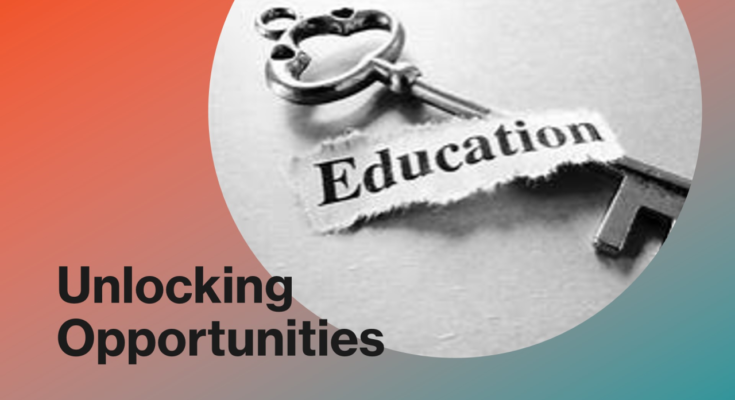In a world teeming with challenges and opportunities, one tool stands out as the key to unlocking a brighter future: Education. From the bustling streets of urban centers to the quiet corners of rural villages, education has the transformative power to uplift individuals and societies alike. Let’s dive into why education is not just important, but essential for personal growth, societal progress, and global prosperity.
1. Empowerment: Education empowers individuals to shape their destinies. It equips them with knowledge, skills, and critical thinking abilities necessary to navigate life’s complexities. Whether it’s mastering basic literacy or delving into advanced academic disciplines, education empowers people to make informed decisions, pursue their passions, and contribute meaningfully to society.
2. Breaking Barriers: Education is the great equalizer, breaking down barriers of inequality and discrimination. Regardless of gender, race, socioeconomic status, or background, education provides a level playing field where merit and talent can flourish. By ensuring access to quality education for all, we can bridge the gap between privilege and disadvantage, fostering a more inclusive and equitable world.
3. Innovation and Progress: Education is the engine driving innovation and progress. It cultivates creativity, curiosity, and problem-solving skills essential for tackling the challenges of the 21st century. From groundbreaking scientific discoveries to revolutionary technological advancements, educated minds are at the forefront of driving change and shaping the future.
4. Economic Prosperity: Education is not just an investment in individuals; it’s an investment in the prosperity of nations. Studies consistently show a strong correlation between education levels and economic development. A well-educated workforce attracts investment, drives innovation, and fuels economic growth. Moreover, education equips individuals with the skills needed to adapt to evolving job markets, reducing unemployment and poverty.
5. Global Citizenship: In an increasingly interconnected world, education fosters global citizenship and cross-cultural understanding. By exposing individuals to diverse perspectives, cultures, and ideas, education promotes tolerance, empathy, and respect for others. It nurtures the next generation of leaders capable of addressing global challenges such as climate change, poverty, and conflict.
6. Health and Well-being: Education is not just about acquiring knowledge; it’s also about promoting health and well-being. Educated individuals are more likely to make healthy lifestyle choices, seek medical care when needed, and adopt preventive measures against diseases. Furthermore, education empowers people to advocate for their rights, access healthcare services, and contribute to public health initiatives.
7. Lifelong Learning: Education is a journey, not a destination. It’s a lifelong pursuit of knowledge, growth, and self-improvement. In a rapidly changing world, the ability to learn, unlearn, and relearn is essential for personal and professional success. Education instills a passion for learning and curiosity that transcends formal schooling, enriching lives and expanding horizons.
The Value of a Degree: Unlocking Opportunities and Shaping Futures
In today’s competitive world, earning a degree is often seen as a critical step toward personal and professional success. Whether it’s a bachelor’s, master’s, or doctoral degree, higher education provides individuals with the knowledge, skills, and credentials needed to thrive in their chosen fields. However, the decision to pursue a degree is a significant one, involving time, effort, and financial investment. This article explores the importance of a degree, its benefits, challenges, and how it can shape your future.
What is a Degree?
A degree is an academic qualification awarded by a college, university, or other educational institution upon the successful completion of a program of study. Degrees are typically categorized into three levels:
- Undergraduate Degrees
These include associate degrees (typically two years) and bachelor’s degrees (typically four years). They provide foundational knowledge in a specific field and are often the minimum requirement for many professional jobs. - Graduate Degrees
These include master’s degrees (one to two years) and doctoral degrees (three to seven years). Graduate programs offer advanced knowledge and specialization in a particular area, often preparing students for leadership roles or academic careers. - Professional Degrees
These are specialized degrees required for certain professions, such as medicine (MD), law (JD), or business (MBA). They combine academic study with practical training to prepare students for specific careers.
Benefits of Earning a Degree
- Career Opportunities
A degree opens doors to a wider range of career opportunities. Many employers require at least a bachelor’s degree for entry-level positions, and advanced degrees can lead to higher-paying roles and leadership positions. - Higher Earning Potential
On average, individuals with a degree earn significantly more than those without one. According to data from the U.S. Bureau of Labor Statistics, bachelor’s degree holders earn about 67% more than high school graduates over their lifetime. - Skill Development
Degree programs provide not only subject-specific knowledge but also transferable skills such as critical thinking, problem-solving, communication, and teamwork. These skills are valuable in any career. - Networking Opportunities
College and university environments offer opportunities to connect with peers, professors, and industry professionals. These connections can lead to internships, job opportunities, and lifelong professional relationships. - Personal Growth
Pursuing a degree is a transformative experience that fosters personal growth. It encourages independence, self-discipline, and a broader perspective on the world. - Credibility and Recognition
A degree is a recognized credential that demonstrates your expertise and commitment to a field. It can enhance your credibility and make you a more competitive candidate in the job market.
Challenges of Pursuing a Degree
- Financial Cost
The cost of higher education can be a significant barrier for many individuals. Tuition, fees, books, and living expenses can add up, leading to student loan debt for some. - Time Commitment
Earning a degree requires a substantial time investment, often several years. Balancing studies with work, family, and other responsibilities can be challenging. - Academic Pressure
Degree programs can be academically demanding, requiring dedication, hard work, and resilience. Some students may struggle with the workload or the transition to higher education. - Uncertain Job Market
While a degree can improve job prospects, it does not guarantee employment. Some graduates may face challenges finding jobs in their field, especially in competitive industries.
Is a Degree Right for You?
The decision to pursue a degree depends on your goals, interests, and circumstances. Here are some factors to consider:
- Career Goals
Research the educational requirements for your desired career. Some professions, such as medicine or law, require advanced degrees, while others may prioritize experience or certifications. - Financial Situation
Evaluate the cost of a degree and explore funding options, such as scholarships, grants, and student loans. Consider the potential return on investment in terms of future earnings. - Learning Preferences
Think about your preferred learning style. Do you thrive in a structured academic environment, or do you prefer hands-on experience? Some careers may offer alternative pathways, such as apprenticeships or vocational training. - Long-Term Plans
Consider how a degree aligns with your long-term personal and professional goals. Will it provide the skills and opportunities you need to achieve your aspirations?
Alternatives to Traditional Degrees
While a degree is valuable, it is not the only path to success. There are several alternatives for those who may not want to pursue traditional higher education:
- Vocational Training
Trade schools and vocational programs offer specialized training in fields such as plumbing, electrical work, or cosmetology. These programs are often shorter and more affordable than degree programs. - Online Courses and Certifications
Platforms like Coursera, Udemy, and LinkedIn Learning offer online courses and certifications in various subjects. These can be a cost-effective way to gain new skills or advance your career. - Apprenticeships
Apprenticeships combine on-the-job training with classroom instruction, allowing individuals to earn while they learn. They are particularly common in skilled trades and technical fields. - Entrepreneurship
For those with a business idea, entrepreneurship can be a viable alternative to traditional education. Many successful entrepreneurs have built thriving businesses without a degree.



